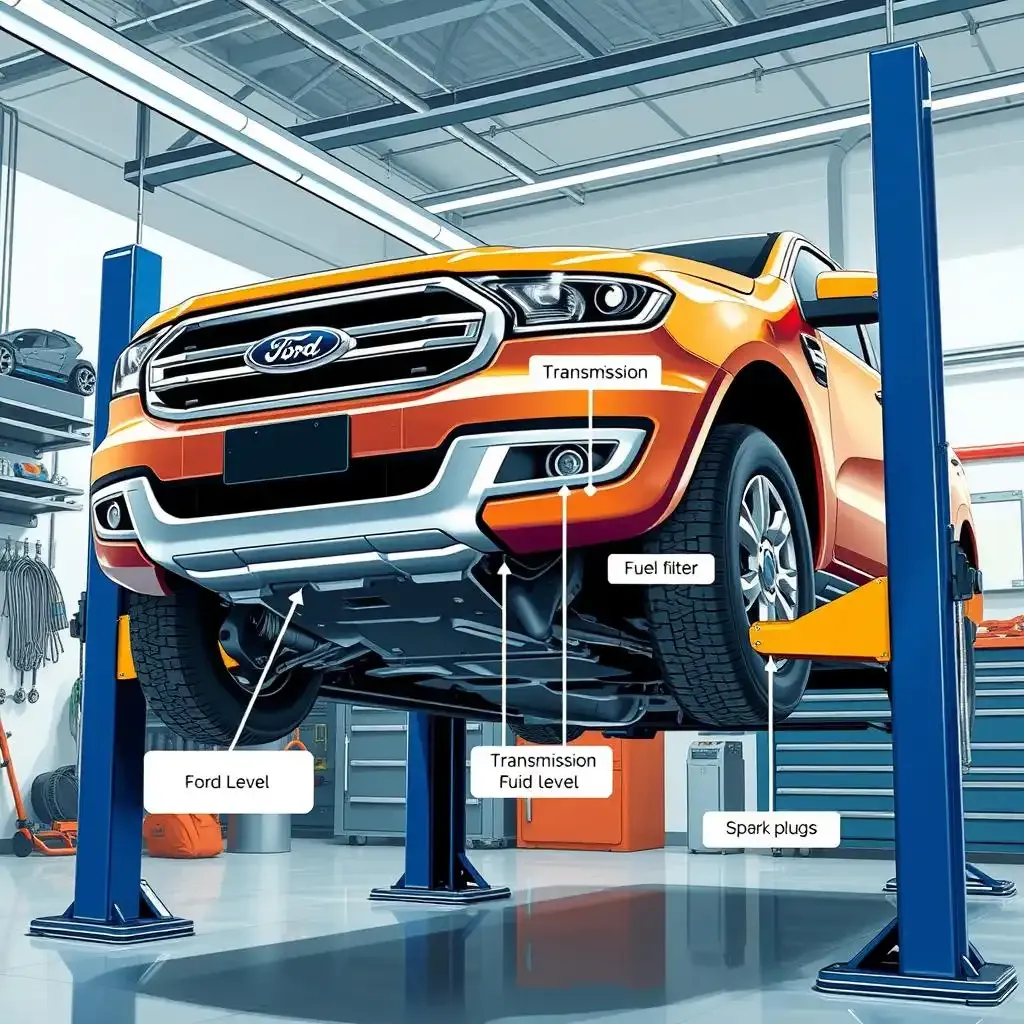Table of Contents
Experiencing a jerking sensation while accelerating in your Ford Everest can be unsettling, to say the least. It's like your trusty steed suddenly decided to perform an unexpected rodeo. This frustrating issue can stem from various sources, ranging from simple fixes you can tackle yourself to more complex problems requiring professional attention. At westernfordhcm, we understand your need for a smooth, reliable ride. This article will guide you through the potential culprits behind that annoying jerk, offering practical solutions and preventative measures. We’ll cover everything from easily checked components to more involved diagnostic procedures, equipping you with the knowledge to get your Ford Everest back to its smooth-operating self. So, buckle up, let’s examine into the reasons why your Ford Everest might be jerking when accelerating and what you can do about it.
Ford Everest Jerking When Accelerating: Common Causes and DIY Fixes

Ford Everest Jerking When Accelerating Common Causes And Diy Fixes
Check Your Transmission Fluid
Hey there, fellow Ford Everest owner! Let's talk about that annoying jerk when you accelerate. One of the first things I always check is the transmission fluid. Think of your transmission fluid as the lifeblood of your gearbox – it keeps everything lubricated and running smoothly. Low or dirty fluid is like trying to ride a bike with a rusty chain; it's going to be jerky and unpleasant. If your fluid is looking dark, burnt, or low, it's time for a change. Check your owner's manual for the right type and how to check the fluid level. It’s a simple check that could save you a lot of hassle! If you're not comfortable with this, there are many great tutorials online. Remember, a properly maintained transmission is a happy transmission!
Problem | Possible Cause | Solution |
|---|---|---|
Jerking during acceleration | Low or dirty transmission fluid | Check and change fluid (or consult a mechanic) |
Rough shifting | Worn transmission components | Professional repair is often needed. |
Inspect Your Spark Plugs
Next up: Spark plugs! These little guys are crucial for ignition. Imagine them as tiny fire starters that ignite the fuel-air mixture in your engine. If they're worn out or fouled, your engine might misfire, leading to that jerky feeling. It's like trying to start a bonfire with damp kindling – it's just not going to work properly! You might need to replace them. It’s a pretty straightforward job if you’re handy, but if you're unsure, a mechanic can help. There are some great videos online showing you how to change spark plugs. This is a great way to understand your engine better too! While you're at it, check your air filter. A clogged filter can also cause poor engine performance and lead to jerky acceleration. Learn more about maintaining your Ford Everest's engine with our guide on the Ford Everest diesel engine.
- Check spark plug condition.
- Replace if necessary.
- Inspect and clean air filter.
Consider Your Fuel System
Finally, let's talk about your fuel system. A clogged fuel filter or low fuel pressure can also cause jerky acceleration. Think of it like this: your engine is a hungry beast that needs a steady supply of fuel to run smoothly. If the fuel isn't flowing properly, it's going to lead to hiccups and hesitations. You might need to replace your fuel filter, which is a relatively simple DIY task. If you suspect a fuel pump issue, it's best to see a professional. Did you know that choosing the right fuel can also impact your Ford Everest's performance? Check out our article on Ford Everest fuel options, including our thoughts on the for a deeper examine. If you're considering an upgrade, read about the differences between the Everest Sport and Platinum models on our comparison page.
Troubleshooting Your Jerking Ford Everest: Advanced Diagnostics and Professional Help

Troubleshooting Your Jerking Ford Everest Advanced Diagnostics And Professional Help
Deeper Diagnostic Tests
Okay, so we've checked the easy stuff – transmission fluid, spark plugs, and the fuel system. But if your Ford Everest's still jerking when accelerating, it's time to get a little more serious. Think of your car's computer as its brain. Sometimes, that brain needs a check-up! A professional mechanic can use a diagnostic scanner to read your car's computer and see if there are any error codes. These codes are like little clues that point towards the problem. It's like a detective solving a mystery! They might find problems with sensors, the throttle body, or other components that aren't as obvious as a low fluid level. Remember that time I took my old Ford to a mechanic because it was making a weird noise? Turns out, it was a tiny loose bolt! You never know what you might find. If you're not comfortable doing advanced diagnostics, don't mess with it. Leaving it to a professional can save you time and potential damage. For more info on keeping your Everest in top shape, check out our guide on maintenance.
- Professional diagnostic scan
- Check for error codes
- Identify potential issues
Inspecting the Transmission
If the diagnostic scan doesn't reveal the culprit, the problem might lie within the transmission itself. This is more complex and often requires a professional's expertise. Think of your transmission as a super-complicated gear system; a tiny issue can cause a big problem. A mechanic with specialized tools can check for worn-out parts or internal problems that can cause jerking. They can also check the transmission's computer for any errors. It's like getting your heart checked by a cardiologist – you want the best possible care! For more advice on choosing the right Everest model for your needs, you might find our comparison helpful. Sometimes, a simple fix can be overlooked, so a professional opinion is key.
Problem | Possible Cause | Solution |
|---|---|---|
Jerking during acceleration | Transmission problems | Professional inspection and repair |
Rough shifting | Worn clutch (if applicable) | Clutch replacement (if needed) |
When to Call a Professional
Let's be honest, sometimes DIY just isn't enough. If you've tried all the basic checks and your Ford Everest is still jerking, it's time to bite the bullet and call a professional. It's better to get it fixed right than to risk causing more damage. Think of it as getting your teeth cleaned by a dentist – you might not enjoy it, but you know it's necessary for your long-term well-being! A mechanic has the tools and knowledge to diagnose and repair complex problems. They can save you time, money, and potential headaches in the long run. And hey, sometimes it's nice to let someone else handle the dirty work, right? Remember, preventative maintenance is your best friend. Read more about optimizing your Everest's performance in our article on Ford Everest drive modes.
Preventing Future Jerking: Ford Everest Maintenance and Driving Habits
Regular Maintenance: Your Everest's Best Friend
Hey there, Ford Everest pals! Let's talk about keeping that acceleration smooth as silk. Think of your Everest like a finely tuned machine – it needs regular check-ups to stay in top shape. Just like brushing your teeth prevents cavities, regular maintenance prevents those pesky jerks. I'm talking about oil changes, filter replacements (air, fuel, cabin – the whole shebang!), and fluid top-ups. Don't skip those service appointments! They're not just suggestions; they're your Everest's lifeline to a smooth ride. Following your owner's manual religiously is a great start. Also, if you're curious about specific engine maintenance, you should check out our deep examine into the . It's packed with useful information!
- Oil changes every 5,000-7,500 km (or as per your manual)
- Air filter replacement every 12,000-15,000 km
- Fuel filter replacement every 20,000-30,000 km
Driving Style Matters: Smooth Operator
Your driving style plays a HUGE role in how smoothly your Everest accelerates. Think of it like this: jerky driving is like slamming on the brakes and gas pedal repeatedly – not exactly gentle, right? Try to accelerate and decelerate smoothly. Avoid sudden bursts of speed or harsh braking. Imagine you're driving a glass of water – you wouldn't want to spill it, would you? Smooth, consistent movements are key. It's like a dance between you and your Everest, a graceful waltz instead of a chaotic tango. If you're interested in mastering the art of smooth driving, our guide on is a must-read. It helps you optimize your driving for various conditions.
Driving Habit | Effect on Acceleration | Solution |
|---|---|---|
Sudden acceleration | Jerky acceleration | Accelerate gradually |
Harsh braking | Increased wear and tear | Brake smoothly and progressively |
Preventative Measures: A Stitch in Time
Prevention is always better than cure, right? Regularly checking your fluids (transmission, brake, coolant – the works!), keeping your tires properly inflated, and addressing any minor issues promptly can go a long way in preventing those frustrating acceleration jerks. Imagine it's like tending a garden – regular watering and weeding keeps your plants healthy and thriving. Neglecting these little things can lead to bigger problems down the line. For example, low transmission fluid can cause serious damage if left unchecked. So, stay on top of things! And if you're considering a new model, our comparison of the might help you choose the best fit for your needs.
Final Thought
A jerking Ford Everest during acceleration is a problem that demands attention. While some issues might seem minor and easily fixable, others require the expertise of a qualified mechanic. Remember, regular maintenance, mindful driving habits, and prompt attention to any unusual symptoms are your best defense against future jerking episodes. If you're still experiencing problems after trying the suggestions above, don't hesitate to contact westernfordhcm or your trusted Ford service center for professional assistance. Safe and smooth driving awaits!